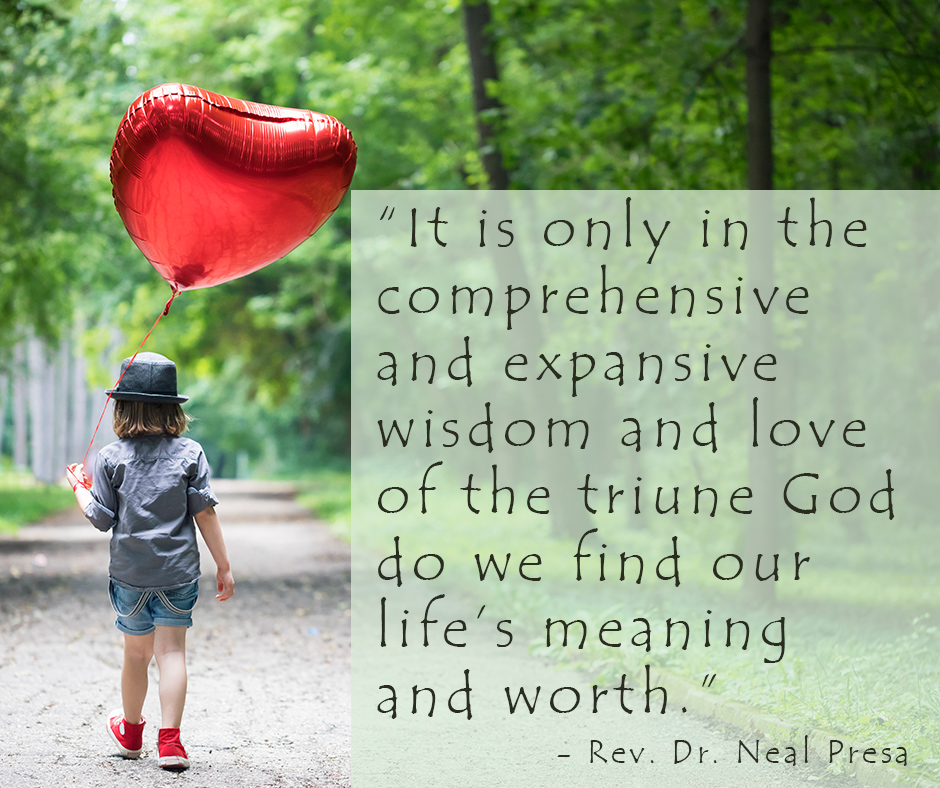5/4/2020
June 7 – Trinity Sunday – Genesis 1:1-2:4a and Matthew 28:16-20
닐 프레사 목사

The whole world is in the midst of a global pandemic with the COVID-19 coronavirus. Infectious disease epidemiologist Dr. Michael Osterholm aptly described these times as not merely a momentary seasonal blizzard, but a “little ice age” which, when all is said and done, will have altered every sector of every part of our lives. Permanent changes are expected the global economy, local commerce, banking, governance, technology, healthcare and communications.
For all of us in faith communities, COVID-19 is already forcing many churches to re-examine and re-calibrate what it means to be “church” when not gathered in a physical structure, and, still for others, sadly, this pandemic has meant the closure of congregations and the laying off of pastors and church staff, as with the financial tragedy that has befallen millions. The comprehensiveness and expansiveness of all that swirls around us and inside us is nothing short of cataclysmic. Thus, Trinity Sunday and the lectionary texts accompanying it are a perfect place to find our anchor and sure footing because it is only in the comprehensive and expansive wisdom and love of the triune God do we find our life’s meaning and worth, our steadfast guide and northstar, the One who is the center and circumference of who we are and whose we are.
The fourth word in English (and the third word in Hebrew) that begins the sacred text of Scripture sets the terms of how we understand the rest of the Bible, and how we understand ourselves and our lives.
“In the beginning, God. . .”

What follows in this lectionary text and in the biblical witness is the creative narrative of the who, the what, the how, the why, and the “for what” of creation, of heaven and earth, and everything in it. The God who is revealed in creation, who reveals God’s self in the creative act of bringing forth light every part of creation, is the One for whom creation comes forth. God does what God does because God is love. Period.
Genesis is not an excursus on the intricacies of the creative dynamic, the molecules and atomic particles that swirled and the time it took for God did what God did. Genesis is narrated to evoke and provoke God’s people to worship the Lord, to love the world, to be humbled at the reality that the God who speaks and acts for them and toward them is the same mighty and awesome God who deeply loves. God’s descriptive of the creation is not dependent on the creation’s affirmation or approval; God says “It is good” because all things happen on God’s terms. And what are God’s terms. Love. God did what God did not out of obligation on anyone’s part, but because of who God is.
By the time we get to the New Testament Gospel according to Matthew, penned a few decades following the Lord’s resurrection, we encounter a narrative of doubting, perhaps fearful disciples preparing to venture off to bear witness of the life and love of Jesus, the crucified and risen One, and the One whom would shortly be the ascended One. Theirs is a comprehensive and expansive calling, “All authority in heaven and on earth has been given to me. Go therefore and make disciples of all nations. . .” That’s pretty daunting language. Like the immense need of logarithmically increasing COVID-19 infections and deaths, we can quickly fall into compassion paralysis – the need is so much that we are stupefied into doing little or nothing. Here’s how Jesus speaks to the heart of the disciples and to us: “And remember, I am with you always, to the end of the age.”
The sure and certain promise is that His accompaniment with us on life’s and faith’s journey is a lifelong fellowship that is life-giving, and life-sustaining. It is grounded in the nature of the calling, of the baptizing, of the teaching, of the witnessing: it is to be done in the name of the Father and of the Son and of the Holy Spirit. You can’t get any comprehensive and expansive than that.
Ancient Christians saw in the three interlocking circles of the 트리케라 a pictorial metaphor of the triune God: the Father, the Son, and the Holy Spirit – the Creator, the Redeemer, and the Sanctifier – in a loving dance. St. Augustine of Hippo called this dance that of the Lover, the Beloved, and the Love that is their fellowship. It is into and with that community of triune unity that we live, and move, and have our being, the One who created, the One whom we worship and serve, and the One to whom and for whom we bear witness in a hurting and fragile world.
In the name of the Father, and of the Son, and of the Holy Spirit.
아멘.

